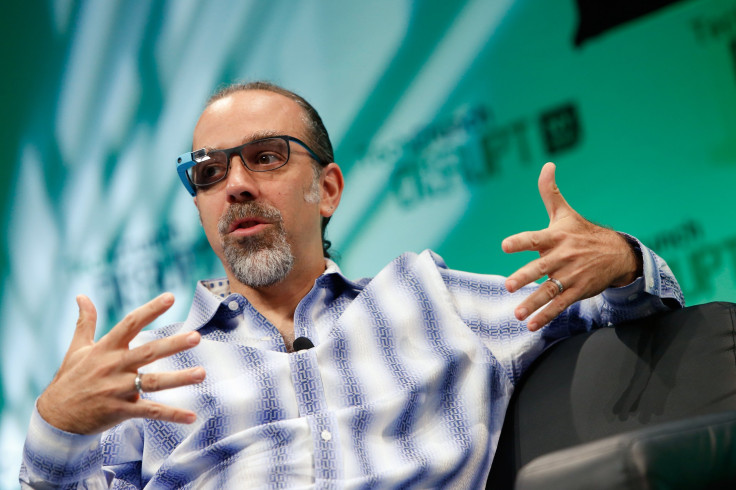Dr. Astro Teller At Disrupt NY: Google X Captain Discusses Google Glass Privacy, Moonshot Projects

“There is no law of physics that says just because we’re connected, there has to be this schism between our physical lives and our digital lives,” Google’s Dr. Astro Teller told a crowd of entrepreneurs and tech writers at the Disrupt NY event at the Manhattan Center on Tuesday.
Teller spoke at the annual tech conference in his role as the director (or Captain, according to his official title at Google) of Google X, a semi-secret lab dedicated to creating “science fiction-sounding solutions” that improve existing technologies by a factor of 10. Google Glass, the self-driving car and Flux, a company that announced $8 million of funding on Tuesday, all started as “moonshot” projects in the Google X labs.
With a sky-blue Google Glass strapped to his face, Teller told the attendees a little more about Google X’s mission, future goals, and the privacy concerns surrounding Google Glass.
“We’re excited about how tech can be used to get tech out of the way,” he said. Technology “needs to be more like anti-lock brake systems in cars, which do exactly what we need them to do, when we need them, without us realizing they are even present. [It can] make us feel more human, not less human, more in the moment, not disconnected.”
Case in point: Google Glass, which Teller said was founded on the idea that a smart phone would work best if people didn’t have to carry one around all day or poke at them with their fingertips.
But on the flip side of convenience are concerns about safety and privacy. The potential ability of Google Glass to surreptitiously take pictures and record video creeps out many people and has already gotten the so-called smart glasses banned by casinos, strip clubs and movie theaters. Several states have proposed banning use of Google Glass while driving.
Teller admits these are legitimate concerns, but notes Google Glass is far from the first to push the privacy boundary.
“I grant that people are generally uncomfortable with how fast privacy issues are changing in the world, but Google Glass is not going to move the needle on that,” Teller said, noting how cameras are already ubiquitous in our lives and mentioning a New York Times article from the 1800s that voiced similar privacy concerns when the camera was first invented.
It’s true that Google Glass in its current form lights up while recording and is limited to the direction the user is facing, making it “the world’s worst spy camera,” according to Teller, but what happens when the technology develops and become less obtrusive? one attendee asked. After all, that’s one of the primary goals of Google X, which is working on a smart contact lens.
Teller more or less evaded the question, saying that the goal of moonshot projects is to create a positive impact in the world and not to ruin privacy. The contact lens was designed with the purpose of providing an easier method for diabetics to monitor glucose, he said, and the self-driving car was built to solve the problem of 30,000 car-related deaths in the U.S. every year. There is also Project Loon, a Google X moonshot to provide Wi-Fi to isolated parts of the world via a network of balloons.
Those are just the few projects Teller could mention. While Google X accepts submissions for moonshot ideas, the Captain said he’s not allowed to talk about most of what the lab is doing.
But he did say there are two major problems he wants to work on solving. The first is improving the agriculture industry to make it more efficient and sustainable, and the other is improving batteries.
“A 10x improvement in energy density,” Teller said, “would change the world so radically we can’t even see where that would be.
© Copyright IBTimes 2025. All rights reserved.






















